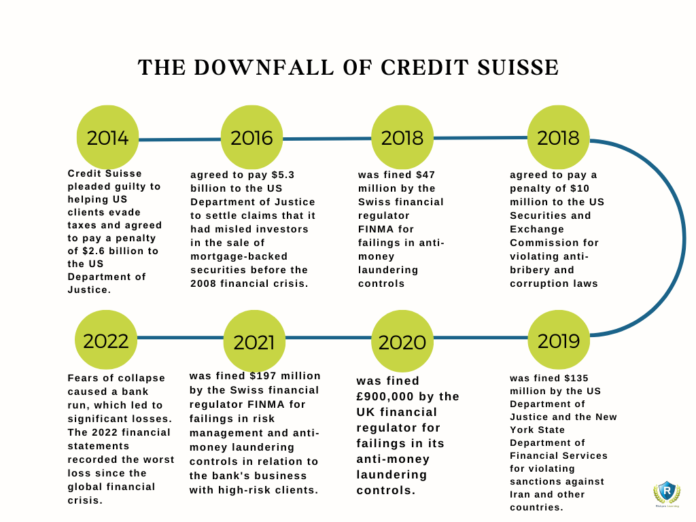Credit Suisse’s collapse is a jolt to a 167-year-old Swiss banking system. It was one of the biggest financial institutions in the world and the second-largest lender in Switzerland. It was classified as a global systemically important bank (GSIB), indicating its crucial role in the global financial system.
However, a series of regulatory issues, reputation, and financial losses resulted in its collapse and subsequent merger with UBS, the largest lender in Switzerland.
Timeline of Credit Suisse Collapse
Here are some important regulatory penalties and its compliance failure Timeline of Credit Suisse:
- 2014: Credit Suisse pleaded guilty to helping US clients evade taxes and agreed to pay a penalty of $2.6 billion to the US Department of Justice.
- 2016: Credit Suisse agreed to pay $5.3 billion to the US Department of Justice to settle claims that it had misled investors in the sale of mortgage-backed securities before the 2008 financial crisis.
- 2018: Credit Suisse was fined $47 million by the Swiss financial regulator FINMA for failings in anti-money laundering controls in its foreign exchange business.
- 2018: Credit Suisse agreed to pay a penalty of $10 million to the US Securities and Exchange Commission for violating anti-bribery and corruption laws in its investment banking business.
- 2019: Credit Suisse was fined $135 million by the US Department of Justice and the New York State Department of Financial Services for violating sanctions against Iran and other countries.
- 2020: Credit Suisse was fined £900,000 by the UK financial regulator for failings in its anti-money laundering controls.
- 2021: Credit Suisse was fined $197 million by the Swiss financial regulator FINMA for failings in risk management and anti-money laundering controls in relation to the bank’s business with high-risk clients.
- 2022: Fears of collapse caused a bank run, which led to significant losses. The 2022 financial statements recorded the worst loss since the global financial crisis.
Public confidence in Credit Suisse collapsed after the bank acknowledged “material weaknesses” in its bookkeeping practices. As a result, people began withdrawing their money, causing Credit Suisse’s stock to plunge by 30%. To maintain liquidity, Credit Suisse secured a $54 billion loan from the Swiss National Bank, but it was not enough to stop the “bleeding.” Eventually, UBS agreed to buy Credit Suisse for more than $3.25 billion.
Tax Evasion Services
The Credit Suisse Collapse highlights the negative power of bad risk management, transparency, and reputation. Credit Suisse’s troubles began with its involvement in allowing U.S. clients to evade taxes in 2014, which resulted in a hefty penalty.
Credit Suisse helped wealthy clients evade taxes by providing them with a range of services that allowed them to hide their assets and income from US tax authorities. Some of the methods used by Credit Suisse to facilitate tax evasion included creating sham entities and maintaining secret accounts.
One example of Credit Suisse’s involvement in tax evasion was the case of Roger Schaerer. He was a former Credit Suisse banker who pleaded guilty in 2014 to helping US clients evade taxes. He reportedly advised clients to carry cash in small amounts on trips to Switzerland. He helped deposit it into their Swiss bank accounts to avoid detection by US customs officials.
Schaerer’s actions were part of a broader pattern of behavior by Credit Suisse to help wealthy clients evade taxes.
Role in the Financial Crisis of 2008
In 2016, Credit Suisse agreed to pay a penalty of $5.3 billion to the US Department of Justice (DOJ) to settle claims that it had misled investors in the sale of residential mortgage-backed securities (RMBS) before the 2008 financial crisis. RMBS are securities that are backed by a pool of mortgages and were a significant contributor to the financial crisis.
The DOJ alleged that Credit Suisse had made false and misleading statements about the quality of the mortgages underlying the RMBS it sold, and had concealed the risks associated with those securities. These allegations included claims that Credit Suisse had knowingly sold RMBS containing loans that did not meet underwriting guidelines, and had provided inflated appraisals for the underlying properties.
The settlement represented one of the largest fines ever paid by a bank for misconduct related to the sale of mortgage-backed securities. In addition to the penalty, Credit Suisse also agreed to provide $2.8 billion in consumer relief to assist homeowners who were harmed by the conduct at issue.
The settlement was part of a broader effort by the DOJ to hold financial institutions accountable for their role in the financial crisis. Other banks, including JPMorgan Chase, Bank of America, and Goldman Sachs, also paid multi-billion dollar fines to settle similar claims.
The settlement highlighted the legal and reputational risks associated with misconduct in the sale of complex financial products and underscored the importance of robust due diligence, risk management, and compliance programs in the financial industry.
Violation of AML Guidelines
FINMA’s investigation found that Credit Suisse had failed to adequately identify and document the beneficial owners of accounts, failed to monitor and report suspicious transactions, and lacked appropriate internal controls and risk management processes in its foreign exchange business.
These failings were deemed to be particularly serious given the significant risks associated with the foreign exchange business, including the potential for money laundering and terrorist financing.
It’s worth noting that foreign exchange transactions are often used in money laundering schemes due to the ability to transfer large sums of money across borders quickly and with minimal regulatory oversight. Therefore, financial institutions engaged in foreign exchange transactions are subject to heightened scrutiny and regulatory requirements related to combating money laundering and other financial crimes.
FCPA violations
Credit Suisse provided employment opportunities and other benefits to family members of foreign government officials in order to win business in the Asia-Pacific region. This practice was found to be in violation of the Foreign Corrupt Practices Act (FCPA), which prohibits companies from offering bribes or other inducements to foreign officials in exchange for business.
The SEC’s investigation found that Credit Suisse had failed to implement adequate internal controls to prevent unlawful payments and did not properly train its employees on FCPA compliance.
Sanctions Violations
According to the settlement agreement, between 2002 and 2008, Credit Suisse engaged in a scheme to process transactions involving Iranian and other sanctioned entities, using methods designed to conceal their involvement and evade detection by US authorities. The bank used a variety of techniques, such as removing or altering information in wire transfer messages and structuring transactions in smaller amounts to avoid triggering sanctions-related alarms.
The DOJ and DFS alleged that Credit Suisse’s conduct violated various US sanctions programs, including those related to Iran, Sudan, Libya, and Burma. The settlement also resolved claims that the bank had violated New York State law by failing to maintain adequate controls and procedures to detect and prevent such conduct.
Luckin Coffee Scandal
The 2019 accounting scandal at Luckin Coffee further damaged Credit Suisse’s reputation. In 2020, the bank’s covert surveillance operation led to the resignation of the CEO, which again impacted its reputation.
Archegos Capital
The collapse of the US hedge fund Archegos Capital in 2021 was the most significant financial loss for Credit Suisse. The bank lost $5.5 billion in the scandal, which resulted in executives’ resignations and significant changes to Credit Suisse’s risk management policies.
Credit Suisse Collapse & Rumors
However, despite these changes, fears of collapse caused a bank run in 2022, which further damaged Credit Suisse’s reputation and led to significant losses.
Credit Suisse’s collapse proves that no financial institution is “too big to fail.” It is essential to have effective risk management policies and to ensure transparency to maintain public confidence. Financial institutions must act in the best interest of their clients and maintain their reputations to avoid significant financial losses. The lessons learned from Credit Suisse collapse should serve as a warning to banks to prioritize risk management function.
Financial institutions must learn from Credit Suisse’s mistakes and take proactive measures to maintain public confidence and ensure long-term sustainability. Certified Bank Forensic Accountant course offered by Riskpro Learning covers the global banking crisis and its causes in its syllabus.
The Credit Suisse collapse also highlights the need for effective regulation to prevent banks from engaging in risky activities.

